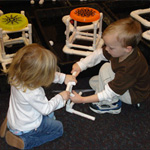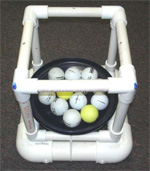|
|
 |
 |
 |
 |
|
 |
02.10.2012
Two-Year College Collaborations and Research: Broadening Participation and Enhancing Geoscience Education
Session ED11E -- Session Chairs: Allison Beauregard and Katryn Wiese
8:00 AM - 10:00 AM; Room 301 (Moscone South) -- Monday, December 5th, 2011
Jan Hodder: Univ of Oregon, Oregon Inst of Marine Biology, Charleston, ORED11E-06 (Invited)
The Centers for Ocean Science Education Excellence: Partnering with Community Colleges to Enhance Ocean Education and Broaden Participation
MORE >>
|
|
|
 02.08.2012
02.08.2012
The NOAA Chesapeake Bay Office helps a range of students—from elementary school through high school—build buoys to introduce them to concepts behind observational platforms and to help connect them with their local ecosystem—and to help track measurements in that ecosystem.
MORE >>
|
 |
 02.08.2012
02.08.2012
NOAA’s Chesapeake Exploration is a new and innovative collection of online activities for middle and high school students that bring the science of the Chesapeake Bay to life. Chesapeake Exploration gives teachers and their students unprecedented access to lessons designed around real-time observational data from CBIBS.
MORE >>
|
 |
 02.08.2012
02.08.2012
Another great example of the "build-a-buoy" concept from the Doug Levin from NOAA's Integrated Ocean Observing Program (IOOS). Students as young as kindergarten can build these buoys with supplies from a local hardware store and become active stewards of their local watershed.
MORE >>
|
 |
02.02.2012
The Best of COSEE Hands-On Activities offers ocean scientists simple, engaging, and easily accessible hands-on activities that will make your presentations to K-12 students, the public, or other non-science audiences more effective. This collection was gathered from across the COSEE Network, with each Center submitting their best hands-on activities.
MORE >>
|
 |
01.24.2012
After a successful launch in June of 2011, the Aquarius/SAC-D satellite has begun collecting global salinity data - but it is not without challenges. Learn from NASA scientists what it took to design, develop, and test the Aquarius satellite and how this leads to the collection of accurate global data in this COSEE-OS hosted webinar series.
MORE >>
|
 |
01.20.2012
COSEE-OS has partnered with the Institute for Broadening Participation (IBP) in a joint effort to increase diversity in the ocean sciences. IBP is a non-profit organization created to design and implement strategies to increase access to STEM (Science, Technology, Engineering, and Mathematics) education and careers for diverse underrepresented groups. IBP's mission is to make education and careers in science more accessible to students - particularly to members of underrepresented groups, support faculty and administrators as they work to include students from a variety of backgrounds in their programs, and foster an on-going exchange of ideas and resources between individuals and institutions who are working to navigate their future in the STEM fields.
MORE >>
|
 |
12.09.2011
BatchGeo is an interactive map making tool based around tabular data (tables and spreadsheets). It accepts addresses, intersections, cities, states, and postal codes for production of google maps that show location data.
MORE >>
|
 |
10.20.2011
Graduate students in the sciences who both teach and conduct research show greater improvement in their research skills than do those who focus exclusively on laboratory work, says a report to be published in the August 19 issue of Science.
MORE >>
|
 |
10.20.2011
This NMEA Special Report on the Ocean Literacy Campaign featuring the Ocean Literacy Scope and Sequence highlights the work of dozens of agencies and hundreds of individuals to bring ocean sciences into the mainstream of both formal and informal education.
MORE >>
|
 |
10.19.2011
Edward Maibach, M.P.H., Ph.D. and Director of the Center for Climate Change Communication (4C) lists five guiding principles in educating the public about the state of our oceans.
MORE >>
|
 |
10.19.2011
A compilation of resources from NASA's Aquarius website pertaining to ocean salinity and the Aquarius/SAC-D observatory launched in June 2011.
MORE >>
|
 |
10.17.2011
Opportunities offered through COSEE Center Partners for undergraduates, graduate students and post-docs.
MORE >>
|
 |
09.20.2011
This page provides links to a series of websites that provide educators with useful information about algal blooms.
MORE >>
|
 |
09.20.2011
Researchers at the Florida Fish and Wildlife Conservation Commission’s Florida Marine Research Institute (FMRI) are on the edge of scientific discovery. They are working to discover the mysteries of Karenia brevis (K. brevis), the dinoflagellate responsible for many of Florida’s red tides.
MORE >>
|
 |
09.12.2011
Resources related to tsunamis.
MORE >>
|
 |
09.11.2011
Intended for anyone who communicates about climate change, the guide’s purpose is to assist communicators in reaching two key audiences - the general public and decision makers from government and business - more effectively.
MORE >>
|
 |
09.10.2011
UMaine graduate student Carrie Armbrecht shares her secrets for a successful teaching experience.
MORE >>
|
 |
09.09.2011
In this activity, created by the National Centers for Coastal Ocean Science, students will investigate eight types of Harmful Algal Blooms, including an example of how scientific perspectives can change rapidly as a result of new research.
MORE >>
|
 |
08.26.2011
In this webinar, the ITEST Learning Resource Center and COSEE (Centers for Ocean Sciences Education Excellence) showcase curriculum materials on topics ranging from biomedicine to engineering design to ecology to ocean sciences.
MORE >>
|
 |
08.26.2011
During this webinar, experts Rob Ferguson, Paulo Maurin and Cathy Sakas from the National Oceanic and Atmospheric Administration (NOAA) share their knowledge and ideas for compelling classroom activities on watersheds and introduce participants to NOAA's Rivers to Reefs Program.
MORE >>
|
 |
08.26.2011
This web page from the Smithsonian Institution’s National Museum of Natural History's Ocean Portal contains a wealth of information for educators - including lesson plans, materials, and resources - on the Gulf oil spill.
MORE >>
|
 |
08.26.2011
Resources related to hurricanes and severe weather.
MORE >>
|
 |
08.26.2011
Resources related to climate change.
MORE >>
|
 |
08.26.2011
Resources related to ocean circulation.
MORE >>
|
 |
|
 |
 |
 |
 |
|
 |
|

